Last Updated on 2 years by admin
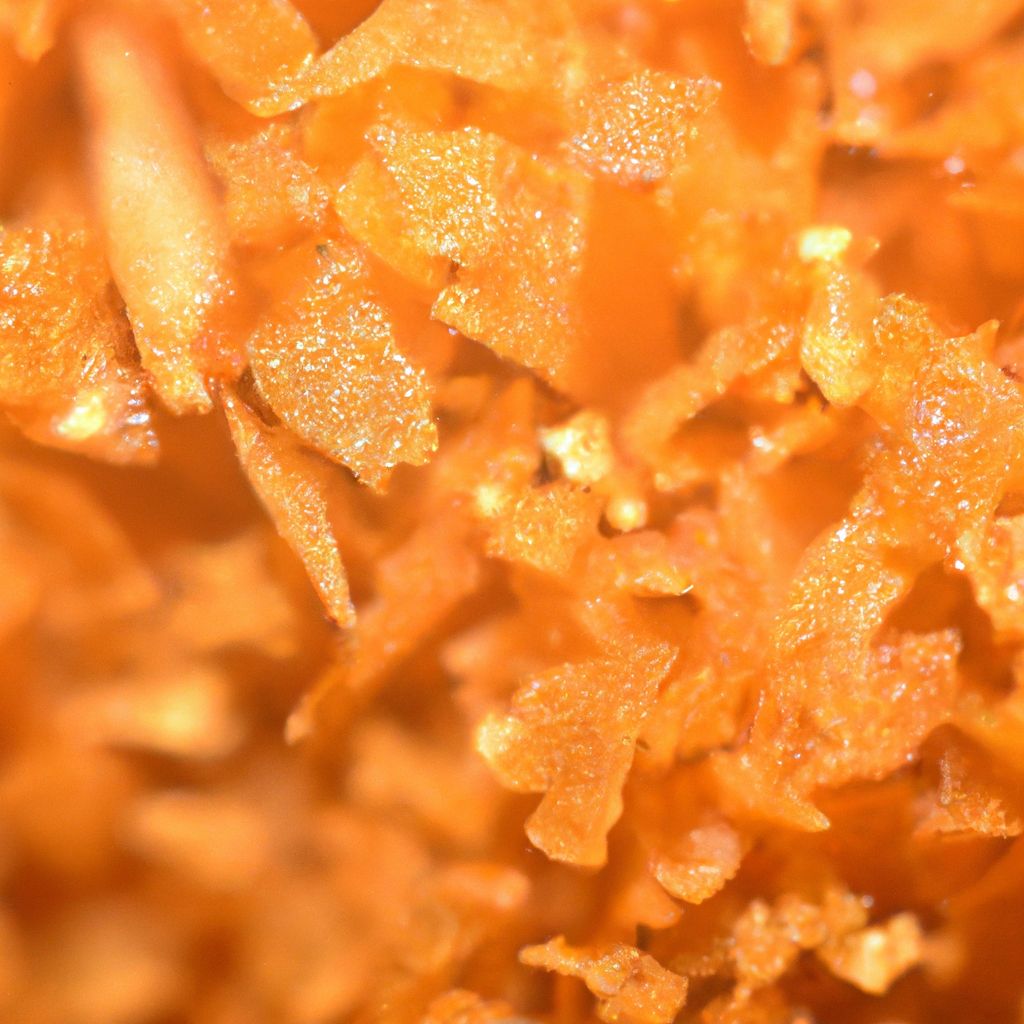
Goldfish flakes are a popular choice for feeding pet goldfish due to their convenience and nutritional value. However, like any other food product, goldfish flakes do have a shelf life. In this article, we will explore the lifespan of goldfish flakes, factors that affect their expiration, signs of expired flakes, health risks associated with feeding expired flakes, and tips for properly storing goldfish flakes to extend their lifespan.
Introduction to Goldfish Flakes:
Goldfish flakes are a type of fish food specifically formulated for the dietary needs of goldfish. These flakes are typically made from a combination of protein-rich ingredients, vitamins, and minerals to support the health and growth of goldfish.
What Are Goldfish Flakes?
Goldfish flakes are small, thin, and lightweight pieces of food that float on the water’s surface. They are designed to provide a balanced and nutritionally complete diet for goldfish. Goldfish flakes are often preferred by fish owners for their convenience and ease of use.
Do Goldfish Flakes Expire?
Yes, goldfish flakes do have an expiration date. Over time, the nutritional value of the flakes can deteriorate, making them less effective in meeting the dietary needs of your goldfish. expired flakes can pose health risks to your goldfish if consumed.
Factors That Affect the Shelf Life of Goldfish Flakes:
Several factors can contribute to the shelf life of goldfish flakes:
- Packaging: The quality of the packaging can impact the longevity of the flakes. Properly sealed and airtight containers can help preserve the freshness of the flakes for longer.
- Storage Conditions: The storage conditions of the flakes play a crucial role in maintaining their shelf life. Exposure to heat, light, and moisture can accelerate the degradation process.
- Exposure to Air and Moisture: Goldfish flakes can absorb moisture and become stale if exposed to air and high humidity levels.
In the following sections, we will discuss the signs of expired goldfish flakes, the health risks associated with feeding expired flakes, and how to properly store goldfish flakes to extend their lifespan. We will also provide guidance on when to replace the flakes to ensure your goldfish receive the best possible nutrition.
Key takeaway:
- Goldfish flakes do expire: Goldfish flakes have a limited shelf life and can expire if not properly stored.
- Factors affecting expiration: The packaging, storage conditions, and exposure to air and moisture can all impact the shelf life of goldfish flakes.
- Health risks of expired flakes: Feeding expired goldfish flakes can pose health risks to your fish, such as nutrient deficiencies and bacterial growth.
What Are Goldfish Flakes?
Goldfish flakes are a type of fish food that is specifically formulated for goldfish.
What Are Goldfish Flakes? They are small, thin flakes that are easy for goldfish to consume and digest.
Goldfish flakes contain a balanced blend of nutrients and vitamins that are essential for the health and wellbeing of goldfish.
They provide the necessary protein, carbohydrates, and fats that goldfish need to thrive.
Goldfish flakes are typically made from a combination of ingredients such as fish meal, shrimp meal, soybean meal, and various vitamins and minerals.
They are designed to float on the water’s surface, mimicking the natural eating behavior of goldfish.
Goldfish flakes are an important part of a goldfish’s diet and should be fed to them in appropriate portions to ensure their nutritional needs are met.
Providing a varied diet with different types of fish food, including flakes, pellets, and fresh vegetables, can help promote the overall health and vitality of goldfish.
Do Goldfish Flakes Expire?
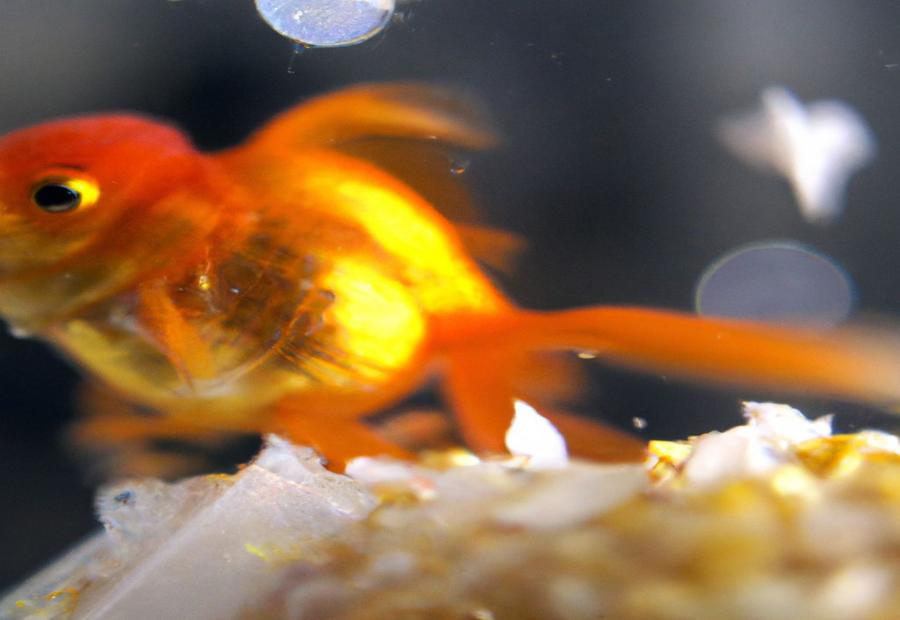
Photo Credits: Bettafishworld.Com by Jack Scott
Goldfish flakes do expire. The expiration date for goldfish flakes is typically indicated on the packaging. It is essential to verify this date prior to feeding the flakes to your goldfish. Expired flakes can lose their nutritional value and have the potential to harm your fish. For the well-being and good health of your goldfish, it is advisable to utilize fresh flakes and discard any that have exceeded their expiration date. Remember to store the flakes in a cool, dry place to maintain their freshness. Always heed the instructions provided by the manufacturer for optimal outcomes. By following these steps, you can ensure that your goldfish receive the necessary nutrition required for a content and thriving life.
Factors That Affect the Shelf Life of Goldfish Flakes
When it comes to the shelf life of goldfish flakes, several factors come into play. From the impact of packaging to storage conditions, as well as exposure to air and moisture, each element can affect how long your goldfish flakes will remain fresh and nutritious. So, whether you’re a newbie fish owner or a seasoned aquarium enthusiast, understanding these aspects is key to ensuring the quality of your goldfish’s food. Let’s dive into the details and uncover the secrets behind maximizing the lifespan of those precious flakes!
1. Packaging
When it comes to purchasing fish food, the packaging of goldfish flakes is a crucial factor to consider. It is important to prioritize materials that ensure the flakes remain dry and fresh by being sturdy and resistant to moisture. Proper sealing is also important to prevent air and moisture from entering, which can lead to spoilage and loss of nutrients.
Additionally, the size of the packaging is significant and should match your requirements. Consider the number of goldfish and frequency of feeding when choosing the size. It should also be easy to store.
Transparent or translucent packaging is useful as it allows you to easily monitor the quantity, quality, and condition of the flakes without opening the package.
Essential information should be provided on the packaging, including clear and accurate details about the product such as ingredients, nutrient values, expiry date, and batch number.
Therefore, when selecting packaging for goldfish flakes, prioritize materials that ensure freshness and proper seal to protect against moisture and air. Choose a size suitable for your needs and opt for transparent packaging with informative labeling to monitor and maintain the quality of the flakes.
2. Storage Conditions
When it comes to storage conditions for goldfish flakes, it is important to consider a few key factors to ensure their longevity and freshness.
| Factor | Storage Condition |
| Packaging | Goldfish flakes should be stored in their original, airtight packaging to prevent exposure to air and moisture. |
| Temperature | Store goldfish flakes in a cool and dry location, away from direct sunlight and heat sources. |
| Humidity | Avoid areas with high humidity, as moisture can cause the flakes to clump and spoil. |
| Contamination | Keep the storage area clean and free from any potential contaminants, such as chemicals or pests. |
| Usage | Use a clean and dry spoon or scoop to measure out the desired amount of flakes, minimizing contact with the remaining food. |
| Re-sealing | After each use, tightly reseal the packaging to prevent air and moisture from entering. |
By following these storage conditions, you can help extend the lifespan of your goldfish flakes, ensuring they remain fresh and nutritious for your fish.
3. Exposure to Air and Moisture
Exposure to air and moisture is a crucial factor that affects the shelf life of goldfish flakes. To demonstrate this, here is a table outlining how exposure to air and moisture impacts the longevity of goldfish flakes:
| Exposure to Air and Moisture | Effects on Shelf Life |
| High exposure to air and moisture | Significantly shortens the shelf life |
| Low exposure to air and moisture | Lengthens the shelf life |
It is important to note that exposure to air and moisture can speed up the degradation process of goldfish flakes. When these flakes come into contact with air and moisture, they may become stale, lose their nutritional value, and even develop mold or bacteria. This can potentially jeopardize the health of your goldfish.
To ensure the longevity of goldfish flakes, it is recommended to store them in airtight containers or resealable bags to minimize exposure to air and moisture. Additionally, keeping the flakes in a cool and dry place, away from direct sunlight, can help prolong their shelf life.
By minimizing exposure to air and moisture, you can guarantee that your goldfish flakes remain fresh and retain their nutritional value for an extended period, providing optimal benefits to your goldfish.
Signs of Expired Goldfish Flakes
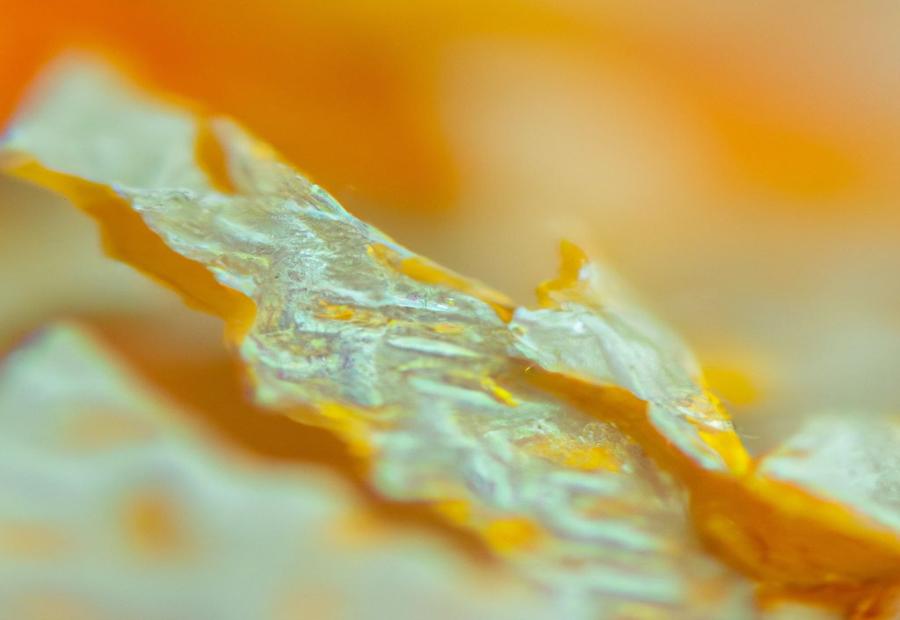
Photo Credits: Bettafishworld.Com by Roger White
When it comes to signs of expired goldfish flakes, there are a few key indicators to look out for:
- Strange odor: If you detect a foul or rancid smell coming from the flakes, it’s a clear sign that they have gone bad.
- Change in color: Discoloration, as well as the presence of mold or fungus, indicates that the flakes have expired.
- Texture changes: Expired flakes can become clumpy or sticky, which is a clear indication of a loss of freshness.
- Reduced nutritional value: As time goes on, the nutritional value of the flakes may decrease, which can have an impact on the health of your goldfish.
A personal experience comes to mind. Last year, I made the mistake of purchasing a new container of goldfish flakes without checking the expiration date. Upon opening it, I noticed a strong, fishy smell and an oily appearance of the flakes. Despite this, I still fed them to my goldfish. However, it didn’t take long for my goldfish to exhibit signs of digestive issues. It didn’t take me long to figure out that the flakes had expired, and I had unknowingly fed my goldfish spoiled food. In response, I promptly disposed of the expired flakes and obtained a fresh batch. Fortunately, my goldfish regained their vitality once provided with proper food. Ever since that incident, I have made it a habit to always check the expiration date and inspect for signs of freshness before feeding my goldfish.
Health Risks of Feeding Expired Goldfish Flakes
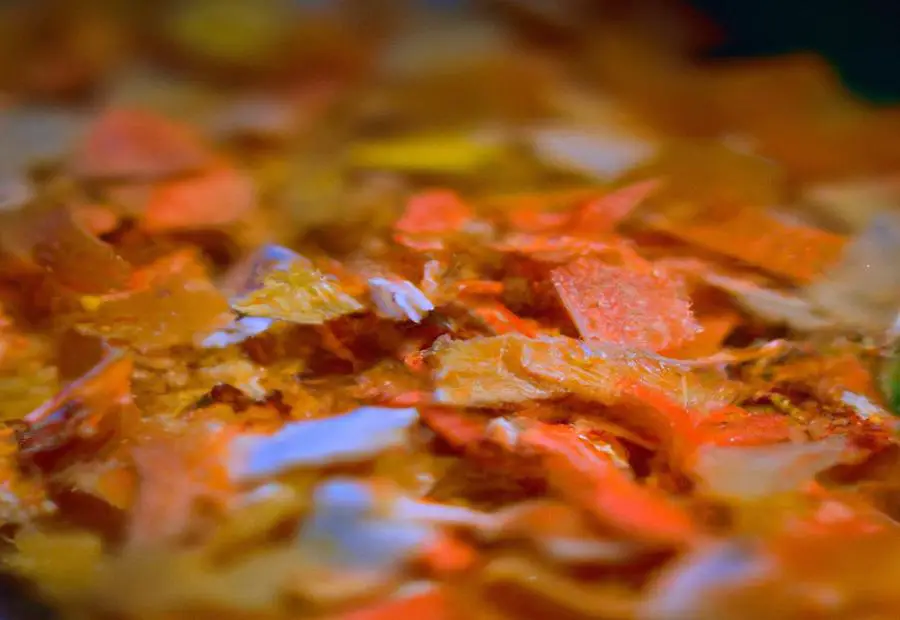
Photo Credits: Bettafishworld.Com by Robert Perez
Feeding expired goldfish flakes can pose several health risks to your pet fish. Firstly, the flakes can harbor harmful bacteria that can cause infections and diseases in goldfish. These bacteria can multiply rapidly, leading to digestive issues and weakened immune systems in goldfish. Additionally, the nutritional value of goldfish flakes deteriorates over time, especially when exposed to light, heat, and moisture. This can result in a lack of essential nutrients like vitamins and minerals, leading to malnutrition and stunted growth in goldfish.
Expired flakes can also develop mold and fungal growth. Feeding goldfish these contaminated flakes can cause digestive problems and respiratory issues. Furthermore, mold and fungus can release toxins that can be harmful to goldfish health. Another risk is the oxidation of fats in goldfish flakes. Over time, these fats can oxidize, creating harmful free radicals. Feeding expired flakes exposes goldfish to a higher risk of oxidative stress, which can damage cells and tissues in their bodies.
Moreover, expired flakes may lose their palatability and freshness. This can result in goldfish refusing to eat them, leading to inadequate nutrition and affecting their health and vitality. Therefore, it is crucial to prioritize the health of your goldfish by regularly checking the expiration date of their food and disposing of any expired flakes. Providing fresh, high-quality fish food is essential for their overall well-being and longevity.
How to Properly Store Goldfish Flakes to Extend Their Lifespan
To properly store goldfish flakes and extend their lifespan, follow these steps:
- Keep the flakes in an airtight container to prevent exposure to moisture and air.
- Store the container in a cool and dry place, away from direct sunlight.
- Avoid temperature fluctuations by keeping the flakes away from heating vents or cold drafts.
- Ensure that the container is tightly sealed after each use to maintain freshness.
- Always handle the flakes with dry hands or utensils to prevent contamination.
- Regularly check the expiration date on the packaging and discard any expired flakes.
- Avoid storing the flakes near strong odors that could affect their taste and smell.
- Consider dividing a large quantity of flakes into smaller portions to minimize exposure to air.
- Regularly inspect the flakes for any signs of mold, discoloration, or unusual odors, and discard if found.
- If needed, you can store the flakes in the refrigerator to prolong their freshness.
By following these steps, you can ensure that your goldfish flakes stay fresh and retain their nutritional value for a longer period of time.
When to Replace Goldfish Flakes
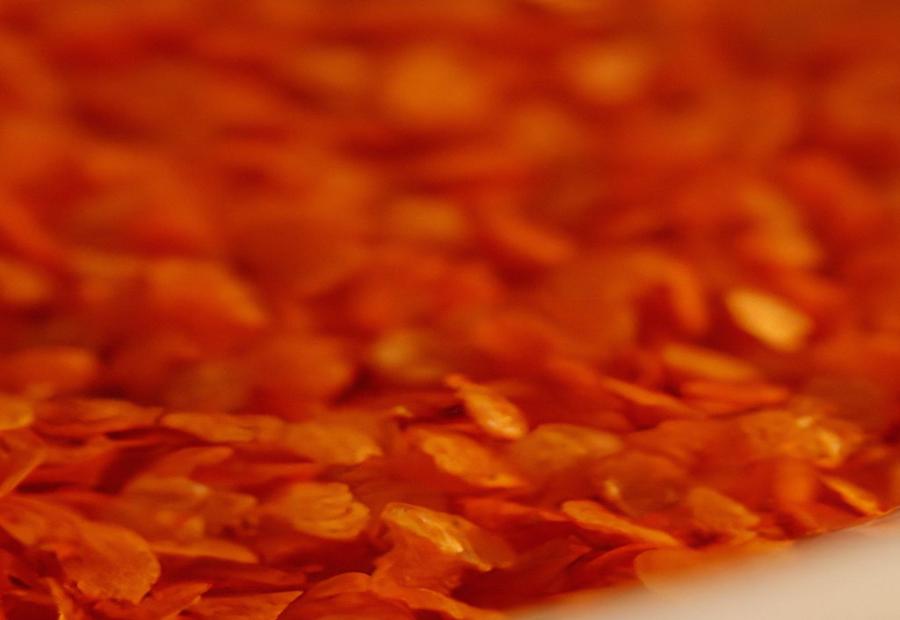
Photo Credits: Bettafishworld.Com by Joshua Smith
Knowing when to replace goldfish flakes is important for maintaining the health and nutrition of your goldfish. There are several circumstances in which it is necessary to replace the flakes:
- One of the main reasons for replacement is when the flakes have surpassed their expiration date. It is essential to check the packaging for the expiration date to ensure that the flakes remain fresh and provide optimal nutrition for your goldfish.
- In case the flakes have become moist or clumpy, it is crucial to replace them. Moisture can create an environment that promotes the growth of mold or bacteria, which can be harmful to your goldfish.
- When the flakes lose their vibrant color and strong aroma, it is an indication that they have degraded in quality. Consequently, such flakes may not offer the necessary nutrients for your goldfish. Replacing them becomes necessary in this situation.
- If your goldfish show a lack of interest or a reduced appetite for the flakes, it may be a sign that the flakes have gone stale or are no longer appealing to your goldfish. This is a clear indication that it is time to replace them.
- Any strange odors emanating from the container or the presence of pests, such as insects or larvae, in the flakes, suggest that the flakes may have been contaminated. In this case, immediate replacement is necessary.
By replacing goldfish flakes when needed, you ensure that your goldfish receive the best nutrition and minimize the risk of any potential health issues.
Some Facts About Do Goldfish Flakes Expire:
- ✅ Goldfish flakes do expire and lose their nutritional value over time. (Source: FishTankMaster)
- ✅ The expiration date of goldfish flakes depends on factors such as packaging quality and brand. (Source: LifeOfFish)
- ✅ It is not recommended to feed goldfish expired flakes for a long time as it can cause health problems. (Source: FishTankReport)
- ✅ Goldfish flakes that are past their expiration date have likely lost most or all of their vitamins, minerals, and nutrients. (Source: FishTankMaster)
- ✅ Moisture can build up in goldfish flakes over time, which can affect their quality if stored for too long. (Source: FishTankReport)
Frequently Asked Questions
Do goldfish flakes expire?
Yes, goldfish flakes do expire. Fish food, including goldfish flakes, can lose their qualities and nutrients over time.
Can feeding goldfish expired flakes kill them?
Feeding goldfish expired flakes can potentially harm their health, but it is unlikely to kill them unless the food is moldy or contaminated with toxic compounds. However, it is not recommended to feed them expired flakes for a long time as they may not receive the required nutrients.
How long do goldfish flakes last?
The shelf life of goldfish flakes depends on various factors such as packaging quality, storage conditions, and brand. Generally, if stored in optimal conditions, goldfish flakes can last for a couple of months past the expiration date. However, they may have lost most or all of their vitamins, minerals, and nutrients by that time.
What are the signs of bad goldfish flakes?
Signs of bad goldfish flakes include a bad odor, changed color and texture, development of fungus, and the presence of foreign substances. If you notice any of these signs, it is best to discard the flakes and avoid feeding them to your goldfish.
Can I feed my goldfish homemade fish food instead of flakes?
Yes, you can prepare homemade fish food for your goldfish using pellets, vegetables, and seafood. However, it is important to ensure the homemade food provides a balanced diet with the required nutrients for your goldfish’s health and well-being. It is recommended to follow a proper preparation method and consult with experienced pet owners or a veterinarian.
How can I prolong the freshness of goldfish flakes?
To prolong the freshness of goldfish flakes, store them in airtight containers or zip lock bags in cool, dark places without moisture. You can also consider using silica packets to prevent moisture build-up. Buying goldfish flakes in small quantities and only opening packaging as needed can also help preserve their freshness.
